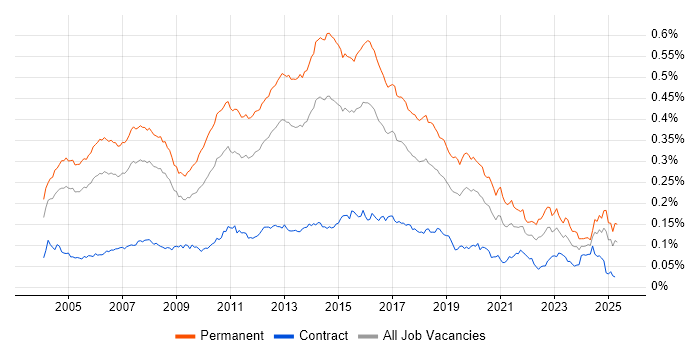Software Analyst
UK
The median Software Analyst salary in the UK is £45,748 per year, according to job vacancies posted during the 6 months leading to 21 May 2025.
The table below provides salary benchmarking and summary statistics, comparing them to the same period in the previous two years.
| 6 months to 21 May 2025 |
Same period 2024 | Same period 2023 | |
|---|---|---|---|
| Rank | 634 | 809 | 816 |
| Rank change year-on-year | +175 | +7 | +199 |
| Permanent jobs requiring a Software Analyst | 84 | 75 | 160 |
| As % of all permanent jobs advertised in the UK | 0.15% | 0.075% | 0.16% |
| As % of the Job Titles category | 0.17% | 0.079% | 0.18% |
| Number of salaries quoted | 61 | 62 | 91 |
| 10th Percentile | £27,000 | £23,500 | £26,250 |
| 25th Percentile | £38,750 | £27,438 | £33,912 |
| Median annual salary (50th Percentile) | £45,748 | £37,500 | £45,000 |
| Median % change year-on-year | +21.99% | -16.67% | +7.14% |
| 75th Percentile | £53,750 | £47,500 | £61,250 |
| 90th Percentile | £66,230 | £55,000 | £65,000 |
| UK excluding London median annual salary | £45,748 | £35,000 | £36,500 |
| % change year-on-year | +30.71% | -4.11% | -2.67% |
All Permanent IT Job Vacancies
UK
For comparison with the information above, the following table provides summary statistics for all permanent IT job vacancies. Most job vacancies include a discernible job title that can be normalized. As such, the figures in the second row provide an indication of the number of permanent jobs in our overall sample.
| Permanent vacancies in the UK with a recognized job title | 50,627 | 94,635 | 91,055 |
| % of permanent jobs with a recognized job title | 90.61% | 94.71% | 91.54% |
| Number of salaries quoted | 26,942 | 67,569 | 57,579 |
| 10th Percentile | £29,444 | £28,500 | £32,500 |
| 25th Percentile | £41,250 | £38,500 | £45,000 |
| Median annual salary (50th Percentile) | £55,000 | £52,500 | £60,000 |
| Median % change year-on-year | +4.76% | -12.50% | - |
| 75th Percentile | £73,750 | £70,750 | £80,000 |
| 90th Percentile | £95,000 | £90,000 | £100,000 |
| UK excluding London median annual salary | £51,564 | £50,000 | £53,000 |
| % change year-on-year | +3.13% | -5.66% | +6.00% |
Software Analyst
Job Vacancy Trend
Job postings that featured Software Analyst in the job title as a proportion of all IT jobs advertised.

Software Analyst
Salary Trend
3-month moving average salary quoted in jobs citing Software Analyst.
Software Analyst
Salary Histogram
Salary distribution for jobs citing Software Analyst over the 6 months to 21 May 2025.
Software Analyst
Top 15 Job Locations
The table below looks at the demand and provides a guide to the median salaries quoted in IT jobs citing Software Analyst within the UK over the 6 months to 21 May 2025. The 'Rank Change' column provides an indication of the change in demand within each location based on the same 6 month period last year.
| Location | Rank Change on Same Period Last Year |
Matching Permanent IT Job Ads |
Median Salary Past 6 Months |
Median Salary % Change on Same Period Last Year |
Live Jobs |
|---|---|---|---|---|---|
| England | +171 | 76 | £45,748 | +21.99% | 22 |
| UK excluding London | +183 | 72 | £45,748 | +30.71% | 19 |
| North of England | +60 | 37 | £45,748 | +52.49% | 3 |
| North West | +15 | 35 | £45,748 | +52.49% | 1 |
| Work from Home | +107 | 28 | £52,500 | +40.00% | 17 |
| South East | +77 | 10 | £27,500 | -35.29% | 9 |
| South West | +132 | 9 | £28,000 | -67.06% | |
| London | +121 | 9 | £55,000 | -21.43% | 6 |
| East of England | +44 | 8 | £66,230 | +47.18% | 3 |
| Scotland | +124 | 4 | - | - | 1 |
| Midlands | +52 | 3 | £40,000 | +6.67% | 3 |
| Yorkshire | +65 | 2 | £25,000 | -33.33% | 2 |
| West Midlands | +54 | 2 | £47,500 | +97.92% | |
| Wales | +44 | 1 | £55,000 | - | |
| East Midlands | +31 | 1 | £30,000 | -36.84% | 3 |
Software Analyst Skill Set
Top 30 Co-occurring Skills and Capabilities
For the 6 months to 21 May 2025, Software Analyst job roles required the following skills and capabilities in order of popularity. The figures indicate the absolute number co-occurrences and as a proportion of all permanent job ads featuring Software Analyst in the job title.
|
|
Software Analyst Skill Set
Co-occurring Skills and Capabilities by Category
The follow tables expand on the table above by listing co-occurrences grouped by category. The same employment type, locality and period is covered with up to 20 co-occurrences shown in each of the following categories:
|
|
||||||||||||||||||||||||||||||||||||||||||||||||||||||||||||||||||||||||||||||||||||||||||||||||||||||
|
|
||||||||||||||||||||||||||||||||||||||||||||||||||||||||||||||||||||||||||||||||||||||||||||||||||||||
|
|
||||||||||||||||||||||||||||||||||||||||||||||||||||||||||||||||||||||||||||||||||||||||||||||||||||||
|
|
||||||||||||||||||||||||||||||||||||||||||||||||||||||||||||||||||||||||||||||||||||||||||||||||||||||
|
|
||||||||||||||||||||||||||||||||||||||||||||||||||||||||||||||||||||||||||||||||||||||||||||||||||||||
|
|
||||||||||||||||||||||||||||||||||||||||||||||||||||||||||||||||||||||||||||||||||||||||||||||||||||||
|
|
||||||||||||||||||||||||||||||||||||||||||||||||||||||||||||||||||||||||||||||||||||||||||||||||||||||
|
|
||||||||||||||||||||||||||||||||||||||||||||||||||||||||||||||||||||||||||||||||||||||||||||||||||||||
|
|||||||||||||||||||||||||||||||||||||||||||||||||||||||||||||||||||||||||||||||||||||||||||||||||||||||
